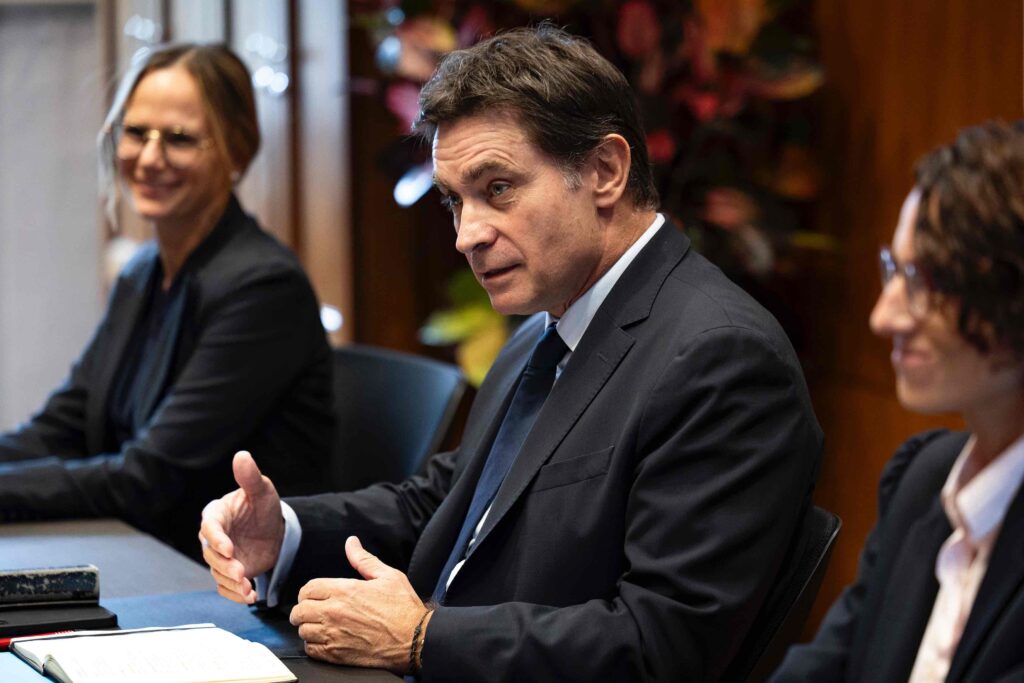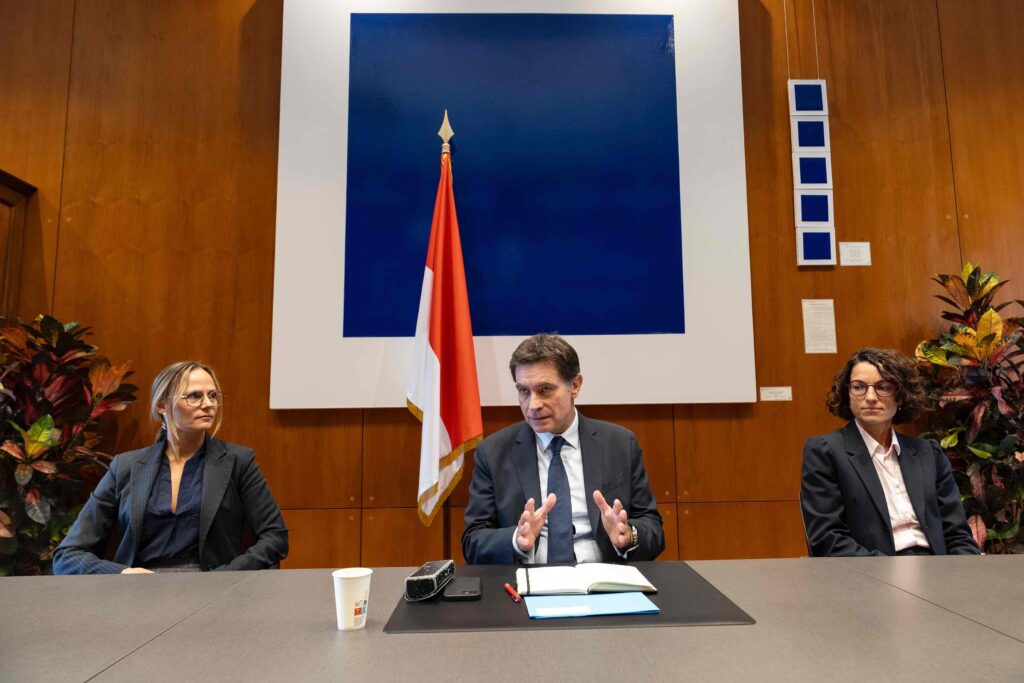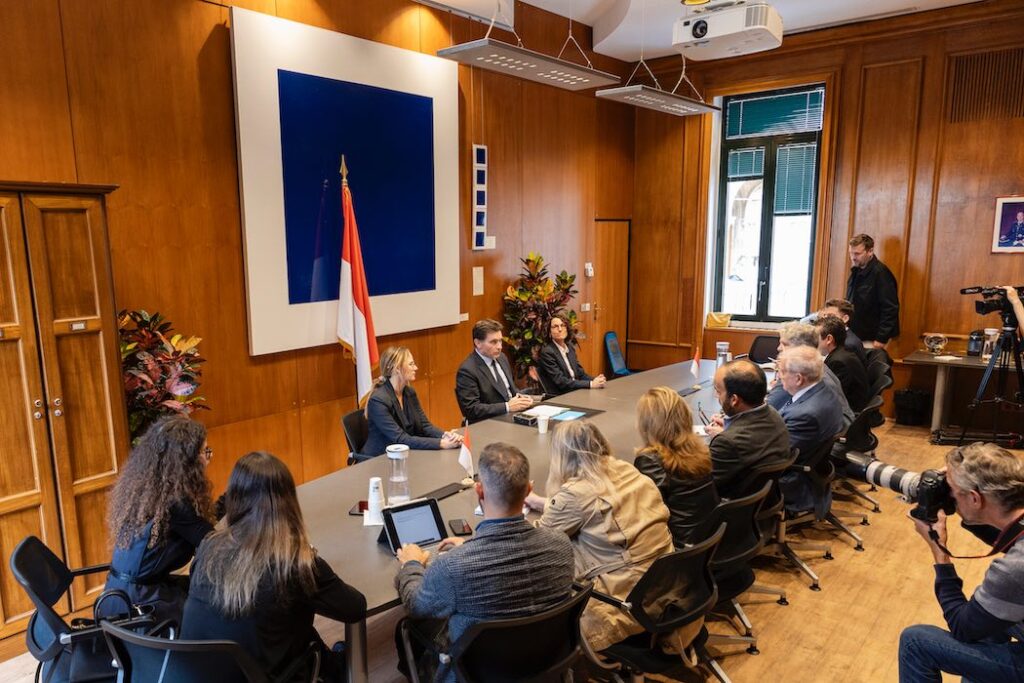Samuel Vuelta Simon reveals his roadmap for Monegasque justice

One year after taking office, the Secretary of State for Justice, Samuel Vuelta Simon, spoke to the press about the reforms that are under way. With a team of just thirty staff, the Department of Justice is carrying out ambitious work to bring Monaco’s judicial administration up to international standards.
“Justice should not be administered in the shadows,” said Samuel Vuelta Simon at his first press conference. It took place in the wake of the opening session of the judicial year, of which he said he was “very proud.” The former French magistrate, with over 30 years’ experience, immediately clarified his role in light of recurring criticism of the judiciary’s independence: “In the past year, I have never given individual instructions in a case. That’s not my role.” He pointed out that the Monegasque Constitution provides for full delegation of judicial power to the courts and tribunals, and that only the Sovereign can hold them to account: “Administering justice means ensuring that magistrates, judges, prosecutors and court clerks work in absolute serenity, totally independently,” he stressed.
2025 sees a first, with the arrival of seven new magistrates on 1 September. In addition to the five replacements, France has granted two additional posts to create an economic and financial affairs unit at the Public Prosecutor’s Office, bringing the total number of magistrates to 17: “France readily accepted without difficulty despite its static budget and restrictions on judicial posts,” said the Secretary of State with satisfaction.
With three vacancies at the Court of First Instance and larger volumes of litigation, an innovative solution was due to be voted on Thursday evening: the creation of a judicial reserve. This structure, inspired by the French model that he helped put in place, will include around fifteen retired magistrates (Monegasque or French) who will support the incumbents. “They are experienced, in some cases very experienced, magistrates : a head of appeal court, different profiles, specialising in criminal, civil or financial matters,” he explained.
A hopeful sign: eleven people have signed up to prepare for the entrance examination. This is a reversal after last year’s was cancelled due to a lack of candidates. Five of them are aiming for the judiciary, three of them exclusively: “It’s a little flame that we keep alight. This is good news because it means that the justice system is beginning to have a rather positive image. I would like at least half of the magistrates serving in Monaco to be nationals,” says Samuel Vuelta Simon. The Institut Monegasque de Formation aux Professions Judiciaires, set up two years ago with just two staff, is bearing fruit: 700 training places were on offer this year in the battle against money laundering, compared with 600 in 2024 and 140 in 2023.

Legislative modernisation
A number of structural bills are in the pipeline, including the introduction of the ‘comparution sur reconnaissance préalable de culpabilité’ (CRPC – court appearances with prior admission of guilt) and the public interest judicial agreement, techniques that will enable swift sanctions in financial cases without overloading investigating judges. Strengthening the powers of the public prosecutor in preliminary investigations and modernising professional statutes (lawyers, notaries, whose statute dates back to 1886, bailiffs) are also on the agenda.
The international dimension remains a priority. “There isn’t a court case in Monaco that isn’t international. There is always an international dimension, and in criminal matters most of all, so we absolutely must develop the Monegasque justice system’s international activity.” Bilateral mutual judiciary assistance treaties are being negotiated with China, Abu Dhabi, Panama and Brazil, following “positive responses” from those countries, which previously demanded such agreements for any cooperation.

Another important announcement: Monaco will chair the Committee of Ministers of the Council of Europe, an “unprecedented opportunity” that generally takes place every 20 years. “It’s an opportunity to prove that we have moved up to the level of the other major States,” he stressed. As far as the FATF is concerned, there is cause for optimism: in December 2024, Moneval recognised Monaco’s compliance with anti-money laundering standards: “We are on an upward trajectory in terms of compliance with international standards”. This is not a sprint, it’s a long-distance race,” he warns, referring to the need for lasting change to Monaco’s “judicial culture”.







